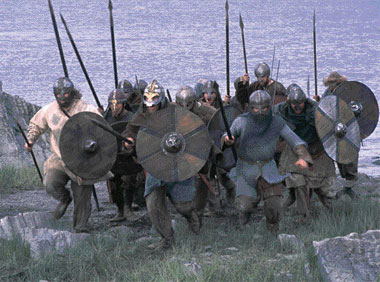|

Climate, a key factor in
the disappearance of Vikings
Greenland's early Viking settlers were subjected to rapidly changing
climate. Temperatures plunged several degrees in a span of decades,
according to research from Brown University.
A reconstruction of 5,600 years of climate history from lakes near
the Norse settlement in western Greenland also shows how climate
affected the Dorset and Saqqaq cultures.

The end of the Norse settlements on Greenland likely will remain
shrouded in mystery. While there is scant written evidence of the
colony's demise in the 14 and early 15 centuries, archaeological remains
can fill some of the blanks, but not all.
What climate scientists have been able to ascertain is that an
extended cold snap, called the Little Ice Age, gripped Greenland
beginning in the 1400s.
This has been cited as a major cause of the disappearance of the
Norse people.Now researchers led by Brown University show the climate
turned colder in an earlier span of several decades, setting in motion
the end of the Greenland Norse.
Their findings appear in Proceedings of the National Academy of
Sciences.The Brown scientists' finding comes from the first
reconstruction of 5,600 years of climate history from two lakes in
Kangerlussuaq, near the Norse "Western Settlement." Unlike ice cores
taken from the Greenland ice sheet hundreds of miles inland, the new
lake core measurements reflect air temperatures where the Vikings lived,
as well as those experienced by the Saqqaq and the Dorset, Stone Age
cultures that preceded them."This is the first quantitative temperature
record from the area they were living in," said William D'Andrea, the
paper's first author, who earned his doctorate in geological sciences at
Brown and is now a postdoctoral researcher at the University of
Massachusetts-Amherst. "So we can say there was a definite cooling trend
in the region right before the Norse disappear.""
The record shows how quickly temperature changed in the region and by
how much," said co-author Yongsong Huang, professor of geological
sciences at Brown, principal investigator of the NSF-funded project, and
D'Andrea's Ph.D. adviser.
"It is interesting to consider how rapid climate change may have
impacted past societies, particularly in light of the rapid changes
taking place today.
"D'Andrea points out that climate is not the only factor in the
demise of the Norse Western Settlement.
The Vikings' sedentary lifestyle, reliance on agriculture and
livestock for food, dependence on trade with Scandinavia and combative
relations with the neighboring Inuit, are believed to be contributing
factors.
Still, it appears that climate played a significant role. The Vikings
arrived in Greenland in the 980s, establishing a string of small
communities along Greenland's west coast. ( but farther south on the
island.) The arrival coincided with a time of relatively mild weather,
similar to that in Greenland today.
However, beginning around 1100, the climate changed.
- ScienceDaily
|

